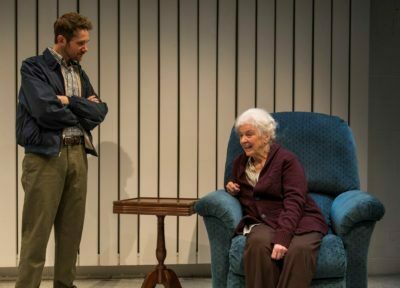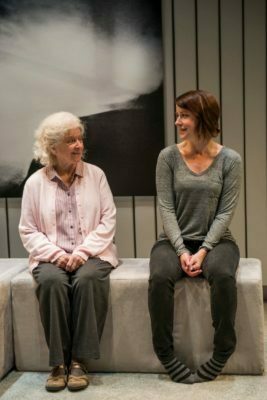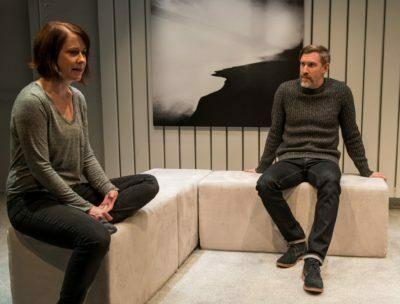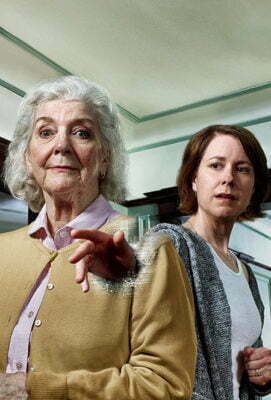Marjorie Prime
Directed by Kimberly Senior
Produced by Writers Theatre, Glencoe
A Futuristic Take on Living Vicariously
Marjorie Prime, now at Writers Theatre, is the latest of several plays in the Chicago area that explores the relationship between memory, intelligence, and possibly artificial intelligence. There’s Love and Information, at Remy Bumppo, The (curious case of the) Watson Intelligence at Theater Wit, and even Steppenwolf for Young Adult’s 1984. Like the others in its genre, Marjorie Prime is more interesting as a premise and a jumping off point for philosophical discussions than as a story in itself. However, this production, directed by Kimberly Senior in what will probably be Writers’ last show in the back of a bookstore, focuses narrowly on a single family, and explores their ambivalence toward each other as much as toward their new computers.

The show is set fifty years in the future, when Marjorie (Mary Ann Thebus) is eight-five years old and sinking into dementia. Her daughter, Tess (Kate Fry), and son-in-law, Jon (Nathan Hosner), check in on her every few days, but for the most part, she depends for care on nurses who aren’t fully attentive. However, the future has developed exciting new technology called primes for pacifying elderly shut-ins. These holograms can be programed to impersonate a dead person in appearance, voice, and personality, based on what their users teach them about “themselves.” Marjorie’s is set to resemble her deceased husband, Walter (Erik Hellman), as he was at the age of thirty, before their lives turned sour. Though Walter Prime is an enormous comfort to her, his processing power isn’t perfect. But a major advantage he has is that he only knows what humans reveal to him, and can be ordered to forget or rewrite inconvenient memories.

Jon thinks having Walter around again is helping Marjorie to remember her own identity, but Tess is displeased. It’s disturbing enough to watch her mother mentally fall apart without also having a glitchy version of her father to compete for attention with. Besides, Marjorie was an abrasive person when she was in her right mind, and Tess isn’t ready to be nice to her yet. But as hinted at by the title and Writers’ poster image, it won’t be long before Tess has cause to start using a prime of her own. When that happens, Tess has to decide how much of her real mother to put into the replacement. Most pressingly, should she be kept ignorant of how twisted she became after her son, Tess’s brother, killed himself? Tess commented that she believes the second half of life is spent living through others, so what does it mean that now that she’s fifty, she’s living through a robot of someone even older?
All four actors pack in a huge amount of emotion and characterization into seventy-five minutes, particularly those who play both organic humans and primes. Kate Fry is saddled with several monologues that sound like the author’s musings on what makes comfort and giving love satisfying, but she melds them seamlessly into Tess’s nervous, overly analytical personality. Mary Ann Thebus is absolutely convincing as both a lonely woman trying to remain sane through somewhat embarrassing means, and a computer program trying to achieve its purpose by adjusting itself to its damaged owner’s confused desires as much as possible. The person we’re told Marjorie used to be is dimly perceivable just beneath both characters’ limitations. Of course, Thebus’s performance is also somewhat ironic. Writer Jordan Harris said in an interview in the program that while working with Lois Smith, who originated the role, he realized that he had written Marjorie as a way of exploring age-related decline, but the part can only be played by an actress who has achieved advanced age while retaining her physical and mental faculties. Hellman and Hosner play characters, one human, one not, who are completely devoted to maintaining the happiness of others, and each is poignant in his own way when confronted with the challenges of the mother-daughter pair they’re supporting, are derive meaning in their own lives from.

Writers plans to move into a larger space soon, but Kimberly Senior takes full advantage of the intimacy of Books on Vernon. Designers Brian Sidney Bembridge and Carolyn Cristofani present us with a blank, sterile future, with no personal effects in either of the homes we see. There are all sorts of political and social implications of primes, depending on how common they are: public figures could be resurrected and made immortal, outdated ideas could be extended indefinitely, people could ignore forging new relationships by artificially prolonging old ones. But it’s only the third Harrison is concerned with, and only insofar as it provides an opportunity for a character study of this family (there aren’t any references to other technological or social changes fifty years in the future). My family has been luckier than Harrison’s (he said Marjorie is based on his grandmother) in that dementia and depression don’t seem to run in us, so I rejected his concept of old age as unrepresentative and lost a major impetus of his philosophizing. But people whose personal experience is closer to Marjorie’s family will likely find much which resonates with them, and those who don’t still have interesting food for thought.
Recommended
Jacob Davis
[email protected]
Reviewed October 29, 2015
This show has been Jeff recommended.
For more information, see Marjorie Prime’s page on Theatre in Chicago.
Playing in Books on Vernon, 664 Vernon Ave, Glencoe, Illinois. Tickets are $35-70; to order, call 847-242-6000 or visit writerstheatre.org. Performances are Tuesdays and Wednesdays at 7:30 pm (with select Wednesday matinees), Thursdays and Fridays at 7:30 pm, Saturdays at 3:00 pm and 7:30 pm, and Sundays at 2:00 pm and 6:00 pm through February 28, 2016. Running time is seventy-five minutes.

